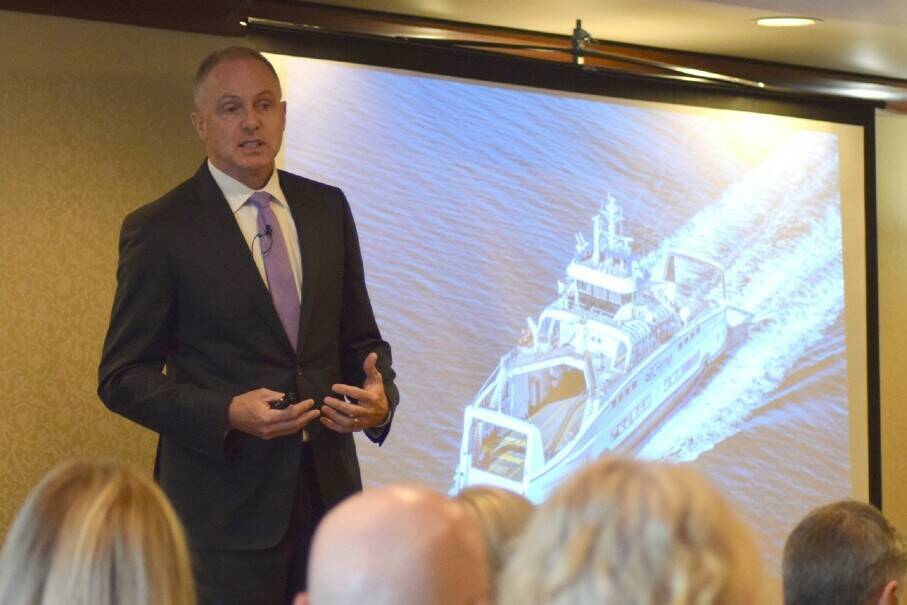BC Ferries is pushing hard to go green, but lack of government support isn’t making the process any easier according to its CEO.
During a Greater Victoria Chamber of Commerce speaking event Thursday, BC Ferries CEO Mark Collins outlined challenges facing the corporation’s sweeping goals to electrify its fleet.
The May 12 luncheon at the Coast Victoria Hotel saw about 80 Greater Victoria politicians, military officials and community and business leaders gather to hear featured speaker Collins’ take on the future of Vancouver Island ferry services and the marine industry.
BC Ferries has invested $600 million in low-carbon technology in the last eight years, he told the crowd.
“I’ll challenge anybody in this room to find another ferry company in North America that’s spent that kind of money. This is something we’re really proud of.”
READ ALSO: BC Ferries removes Wi-Fi service from sailings
According to Collins, BC Ferries’s five primary Island Class ferries – diesel-electric hybrid vessels – will run with nearly zero carbon emissions by 2029 if proper shore charging infrastructure is built at their terminals.
In any infrastructure project undertaken by BC Ferries, however, 20 to 100 government permit processes between provincial and federal ministries each represent potential vetos, he said. At least five projects are currently stalled in the permit process.
“We’re talking to Ottawa saying, ‘are you willing to invest in this infrastructure?’ We’ve been at it for two or three years, and we’re getting crickets,” he said. “Everybody wants to say ‘yes’ and one person can say ‘no’ and everybody’s out. As a society, we’re not going to save the planet if we keep operating like that.”
READ ALSO: Victoria looks to green up fleet by replacing 140 vehicles with electric options by 2030
Permit stalling also presents issues for improving the resiliency of B.C.’s supply chain. For example, Collins said most BC Ferries terminals were constructed under 1960’s building codes and could be compromised in the event of a major earthquake.
“We keep them upgraded, but you really need to start from scratch. Every time I talk about starting the Tsawwassen terminal from scratch, I run into those 100 permits again,” Collins said.
“I’m not saying give us a pass. I’m saying sit down with us and say what we practically need to do to make (new infrastructure) work. We don’t have any time to waste.”
Even with those challenges, many applaud BC Ferries in its efforts to go green, and the spin-offs that brings.
“These are very exciting times for the marine industry,” said Tony Winter, vice-president of Victoria’s Seaspan Shipyards and contractor for BC Ferries. “Running a sustainable operation is no longer nice to have – it’s what our customers and stakeholders expect.”
Do you have a story tip? Email: kiernan.green@blackpress.ca.
Follow us on Twitter and Instagram, and like us on Facebook.
bc ferryGreenhouse gas emissionslabour market

